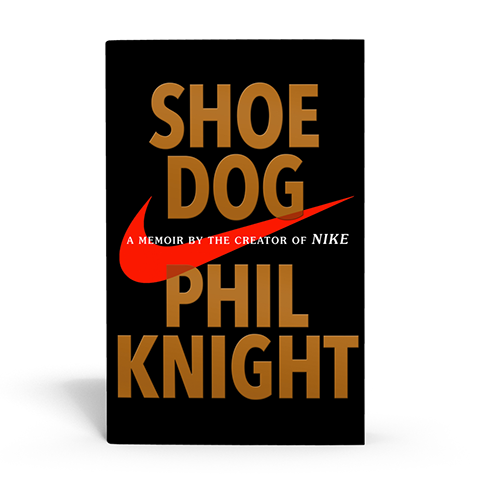Thanks to all of the end of year book lists, my current reading list is swelling with newfound gems and Shoe Dog is one of my new favorites. I devoured it in a single day.

Shoe Dog is the memoir of Phil Knight, founder and CEO of Nike and details the company from its early start through their 1980 IPO. There are several good reviews of the overall book (here, here, and here), but it surprises me that so few have discussed the ethical quandaries that Knight faces as he builds Nike.
There are three key moments where Knight flat-out lies or steals information to build the fledgling Nike. I puzzled over these as an entrepreneur and leader myself and wondered if I would sleep well at night doing something like that.
When is it ok to lie about your business? When is it ok to steal information?
Example #1. Lying about having a company he doesn’t have yet
In his very first meeting with Onitsuka, the Japanese company manufacturing the Tiger shoes which Knight goes on to distribute, he lies about having a company. Having walked in with no more than the information he prepared for a Stanford GSB class project, Knight delivers his presentation and makes up a company name on the spot which he doesn’t have.
“Blue Ribbon,” I blurted. “Gentlemen, I represent Blue Ribbon Sports of Portland, Oregon.”
This was a moment of existential crisis for the early company, and Knight pulls through with a lie. If he had admitted that he didn’t have a company, he wouldn’t have a deal. So he faked it. Despite admiration for his gutsiness, consider for a moment the other side. How would you feel if you were Onitsuka and a business partner lied in this way?
Example #2. Lying about an office he doesn’t have yet
When a competing distributor of Tiger shoes, who Knight dubs ‘The Marlboro Man’ begins to compete against them with national ads, Knight flies out to Japan to meet with Onitsuka again. Faced with the concern that the Japanese company wants a larger U.S. Distributor, he lies again.
Onitsuka wanted for its U.S. distributor someone bigger, more established, a firm that could handle the workload. A firm with offices on the East Coast. “But, but,” I spluttered, “Blue Ribbon does have offices on the East Coast.”
The lie is so successful that he wins the deal:
I tried to be nonchalant as I signed the papers and placed an order for five thousand more shoes, which would cost twenty thousand dollars I didn’t have. Kitami said he’d ship them to my East Coast office, which I also didn’t have.
Example #3. Stealing information from his opponent
Over time, the relationship with Onitsuka begins to sour and Knight suspects that Kitami, the export manager, is talking to his competition. In order to verify this he steals valuable information during a visit to his offices.
The moment he was out of sight I jumped from behind my desk. I opened his briefcase and rummaged through and took out what looked like the folder he’d been referring to. I slid it under my desk blotter, then jumped behind my desk and put my elbows on the blotter.
Clearly, inviting someone over to your office and stealing information from them is wrong! However, it enables Knight to glean valuable information to plan for the preservation of his company. This is the most egregious sin he commits against the company in the book, but also the climax of several other missteps.
An effective leadership strategy, justified by winning
As an entrepreneur, I have great admiration for Knight, Nike and what he’s been able to accomplish. We can only aspire to build such a successful and enduring company. While so many leadership books present overly simplistic, black and white aphorisms, this is the real deal, complete with all of the warts, complex unsolvable problems and unexpected news that entrepreneurs face. While I’m not sure about my own personal comfort level with Knight’s actions, it’s undeniable that this along with everything else was a winning strategy. Today Nike’s market cap is worth over $87 billion dollars and they are an iconic global brand.
It is easy to talk about integrity, but what happens when the entirety of your business and life savings hangs on a thread, and one lie can save you? Where is the line between committing an ethically wrong act and “fake it til you make it”? These are worthwhile and important questions to ask ourselves because every day is a test of our own values and integrity. Through his narrative, Knight is able to build a connection with the reader to the point where I found myself sympathetic, or even understanding, as he toes and transgresses beyond the ethical line of what is right and wrong.
Recently Fortune’s Erin Griffith published a piece, The Ugly Ethical Underside of Silicon Valley, highlighting a long and growing string of startups committing fraud: Hampton Creek, Theranos, Lending Club, Skully, Zenefits. There are examples from outside of tech startups, too, like Volkswagen’s emissions scandal. What if they all began as one white lie? Shoedog highlights the fragility of our own integrity and how easily, when pushed to the brink, entrepreneurs can walk a darker path.
The honesty and openness of Phil Knight’s memoir was refreshing and delightful. Definitely recommend Shoe Dog as a read for anyone.
Ada Chen Rekhi is co-founder & COO of Notejoy, a collaborative notes app for individuals and teams. She’s also an executive coach who works with founders and executives looking to scale themselves as they scale their teams. If you enjoyed this essay, subscribe to her newsletter or follow her on @adachen.